Ellen and Jim Have a Blog, Too
We are two part-time academics. Ellen teaches in the English department and Jim in the IT program at George Mason University.


_Last Chance, Harvey_: an exquisitely moving long walk · 3 February 09
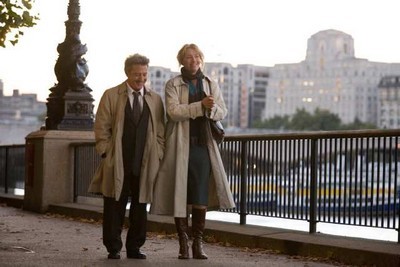
Dustin Hoffman (Harvey Shine) and Emma Thompson (Kate Walker) walking together (Last Chance, Harvey_, 2009) Dear Friends,
Yesterday Yvette and I hurried out to see a film where we feared it was our last chance to see it, although it was but the first weekend it has appeared in local theatres: Last Chance, Harvey, written and directed by Joel Hopkins, produced by Jawal Nga. Nga made Married Life, another film which feels like an intelligent meditation on the private lives of people, only more thoroughly realistic, and, like life, unpredictable. The real flaw, if flaw this be in this case, of Last Chance, Harvey is it’s improbable, too predictable after our hero, Harvey Shine (Dustin Hoffman) and Kate Walker (Emma thompson) have met.
I say “if flaw this be” because the film offers the same mythic romance interlude as Before Sunrise and Before Sunset: all three times, a couple of sensitive decent people come together by chance for an improbable trusting long night’s companionship and in so doing find deeply gratifying solace for themselves and us. The earlier pair of lovers were about 30 years younger, and have sex both nights, but the wonder and joy are analogous. Two people whose nature if not history, interests, outward way of coping with hurt feels congenial congenial encounter one another by chance and hold to one another for a long night’s communion.
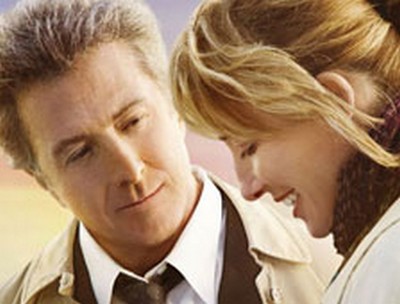
Harvey really listening to Kate, reaching one another, they are sitting in the courtyard of a museum, she telling him of an abortion she had years ago
It’s romance and in this film with a certain amount of strong schmaltz thrown in. For example, Last Chance Harvey includes an idealized presentation of one of these godawful expensive large weddings where the bride (suitably anorexic in looks, Liane Balaban as Susan) and groom (suitably soap opera handsome, James Brolin as Brian) are of course sheerly ecstatic, & relatives & friends are expected to make uplifting optimistic speeches. In Last Chance Harvey, the emotional pain which usually lies under the surface, and comes out at intervals, at such liminal events of high expectation, is only intermittently stressed: Dustin Hoffman is the long estranged father of the bride whose role has been usurped by his wife’s new husband, ever so much more socially-acceptable in looks and manners. What is made explicit is how wonderful and beautiful all this is as long as other characters don’t “ruin” it: Kathy Baker as Jean, Hoffman’s divorced wife, Susan’s strained mother (when Hoffman is around she’s strained) demands that Hoffman behave himself. This is unlike, say, Jack Nicolson’s film, About Schmidt, where, also shown from the angle of the father, the absurdity of the whole affair is put before us strongly, its aggravations, cost, and hypocrisies.
What Last Chance Harvey is about is a long walk. One evening Hoffman as Harvey and Thompson as Kate bang into one another at a British airport (Kate’s job is to be a person at an airport helping passengers and asking questions from a questionnaire) and then neatly just miss one another as he comes out of a taxi she gets into (an archetypal sign to the movie-goer that this couple will end up together). We experience their miseries and difficulties and loneliness of the first parts of their evening and the following morning: that night Kate is pushed into going on a blind date where she doesn’t fit in at all, all the while constantly cellphoned by her clinging divorced aging mother (Maggie Walker, played by Eileen Atkins), whom Kate is emotionally sustaining by cellphone every five minutes of her life. That night Harvey has come from the US, 3000 miles to a wedding where he’s not wanted, does not fit in (no room is made for him at his ex-wife’s house where everyeone else is staying), is inept (his suit doesn’t look right, he says jarring truths he can’t resist as he feels uncomfortable), and the following morning at said wedding, he finds his wife’s new husband is to give his daughter away as he has been her functioning father for years. He is sidelined. It’s around lunchtime, he has missed his plane back (he decides to hurry back even though he’s had signals his firm wants to fire him), and she is having her usual lunch with a book at an airport cafeteria. They encounter one another again, and he begins a determined effort to talk to her.
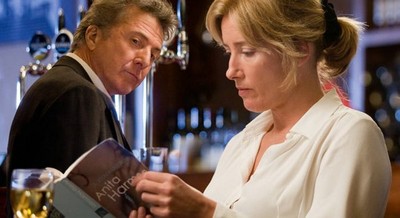
At first Kate resists Harvey’s his efforts to interrupt her, but gradually his need, jokes, and apparent interest in her brings her round and they eat across the way from one another while talking, and then get up and begin to walk, continuing talking.
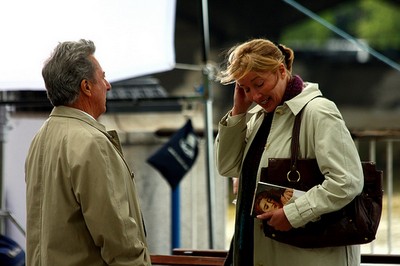
They are in central London, she on her way to a writing class in the middle afternoon, and the walk becomes a marvelous shared long moment where they are spectators at the high activity of life around them, which they react similarly to, with patience, amusement, as they become intimate and reveal themselves to one another. (In contrast, in Before Sunrise and Before Sunset, Julie Delpy and Ethan Hawkes had intense animated political discussions, and discovered congenial tastes and similar interests in say books.)
Well the walk goes on and on and they just don’t want to let go of one another. They almost do part a couple of times: Kate urges Harvey to go to his daughter’s wedding reception that night even though that morning he has been humiliated, and he says he will if she accompanies him as his friend. This necessitates him buying her an appropriate dress (in a shop we see her try on a succession of funnily-fancy dresses in some of which she looks ridiculous), but once there, when he finds he is accepted and begins to dance with people he knows, he seems to forget she’s there (as did her blind date), and she leaves. But he misses her quickly and just before she gets on the elevator, she hears him playing the piano (he is a frustrated failed musician—what he does for a living is write jingles for commercials), and they sit and come together again, this time her longing holding her there insteead of his.
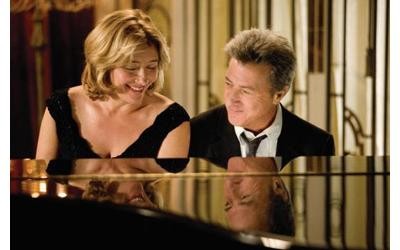
He has told her he wasn’t good enough to make it commercially
That night they agree to meet the next day at noon in the courtyard of the Courthauld Institute (where they have ended up), against her better judgement, but alas, he misses the appointment (we watch her sit there, dressed beautifully for him) because he has an arthymic heart and when the elevator in his hotel breaks down and he runs up the stairs, he collapses and is taken to hospital where British doctors do not listen to patients the way US ones do (money is in question). But Harvey manages to find Kate again through returning to her place of work where she has two kindly women friends, workmates, who direct him to where she has gone: her afternoon writing class once again.
Comedy is provided by Eileen Atkins as Maggie, the mother, not so much in the continual needy phone calls, but Maggie’s apparent thrilling belief her nextdoor Polish older male neighbor (played by Robert Jezek) is some kind of mass murderer. We get quick interwoven takes of Atkins watching the nextdoor neighbor from the window doing things in the garden and coming to dreadful conclusions. He will put wrapped statue in his garage and she concludes it’s a murdered body, and of course phones Kate. As Thompson’s mother, Atkins also frets over what Thompson deprecatingly, wryly ironically, calls her “situation” (unmarried). After the final credits, we get a brief fleeting scene of Maggie coming over to her neighbor’s house to thank him for a gift she had first thought a bomb, and him inviting her in. In this film Romance flowers everywhere.
It’s hard to convey the sweetness and magic of this film without undercutting it in the telling. As I say, it’s like that of Before Sunrise and Before Sunset, only this couple had better not part for 9 years because they are too old for that, and too caught up in messy lives & disillusioned to sustain such a rupture of time. They do not stop to have sex anywhere while we are with them. Hoffman and Thompson are not at all prettied up and perhaps such a scene would have put the audience off and really been as awkward as such an encounter probably in life would have been. As in so many recent movies, the camera work shows us close-ups of real mottled skin, facial features, wrinkled bodies.
Part of the pleasure of the film is the photographing of London (as in Before Sunrise and Before Sunset it was Vienna). Our friends (so to speak) stop in front of a band of young exotically dressed fantastically energized street-performers, pass the big bulks of cheap books in front of the National Theatre, traverse bridges in central London over the Thames, where they pass by people doing all sorts of things.
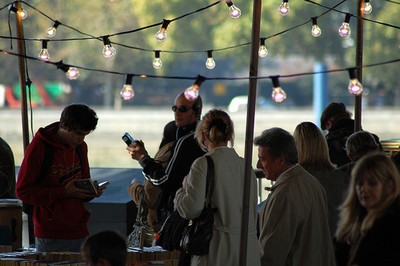
Instead of being anonymously alone, enduring this, looking on, they are together, so it’s not so bad, even fun, and they look out at the sky together. For me it was a sudden pleasure to recognize the Courthauld front square (where Jim and I spent a half day together just a couple of weeks ago when the fountain this pair sit in front of was iced over and watched people ice-skate). Harvey and Kate are Us going through life, which is rather a different story than the ecstatic romance of the two youthful Delpy and Hawkes who seem to live in their strong illusions with hope, on a plane beyond what is around them. Hoffman and Thompson (great actors both) cannot forget their daily emotional pain this way, cannot lose themselves in the moment.
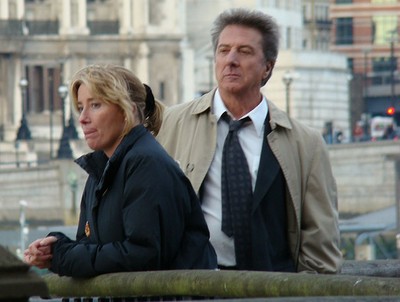
Leaning over the rails, gazing at the Thames, they lose a sense of one another for a moment
It seemed to me self-evident that the film was (so to speak) made for this particular pair of actors and the known or remembered baggage of the types they have played and specific roles too. In the perceptive candid biography by Chris Nickson, I read about her (The Many Faces of Emma), Thompson says that she plays an idealized version of herself which appeals to American audiences: they imagine her this upper class strongly intelligent and semi-tough woman (not really herself she insists) over and over again, a type seen especially appealingly in her roles as Elinor Dashwood (the 1995 Sense and Sensibility) and Helen Schlegel (on the Merchant, Ivory, Jhabvala Howards’ End) and more tragically in the dying super-scholarly spinster, Miss Vivian Dearing (2001, Mike Nichols, Margaret Edson’s Wit), with be it noted the same actress playing her mother figure (Eileen Atkins).
Though it may be said Hoffman’s story was the central thread of the plot-design (she is helping him when they go to the wedding) and Hoffman was equally playing to type, this time a sophisticated intelligent version of Willie Loman (he’s just fired), a modern failure at networking on his cellphone), the movie was made as much with Emma Thompson in mind. Kate Walker is the single woman, aging, now alone, who can take care of herself, and does, who reads, and who has half-chosen her life alone but regrets it (we are in the terrain of Miss Austen Regrets but without the maudlin sentimentality); her manners, good judgement, self-control, here books and writing, and sticking to courtesy as a way of getting through, keep her going.
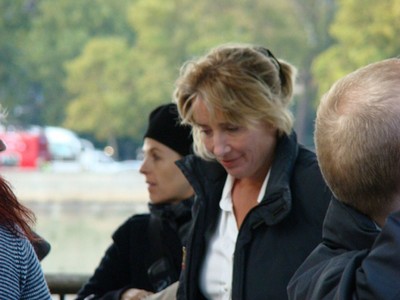
Emma on her daily way to her job
We hear someone reading aloud in her writing class, an older man, and it’s a ludicrously bad version of verbalized sex (what the film omits physically). Here Harvey is saving her while he saves himself, for the male in this film is as much in need of a permanent female as social life makes it hard for a woman to get along and be accepted husbandless.
One can regret (using the same word) that movies and books so rarely show us an older woman alone who is happy with her life. Kate Walker is not happy either. In one of her reminiscences, she almost regrets having had an abortion when young; she characterizes her decision as a “smart woman’s.” But in Emma Thompson’s case the type is admirable, sympathized with, not despised, not mocked, and occasionally left alone by movie’s end (Wit) or mispaired so that she might have been better off staying single (the poignant Mercant, Ivory, Jhabvala 1993 The Remains of the Day). The thing is Thompson is ever tough, she somehow is tough and takes life’s punishments, and carries on, her strength enabling whatever male comes close to her to carry on too. Hoffman as a type could have reached for sucide (which neither Edward Ferrars from S&S or Henry Wilcox would have went for in Howards’ End); that is Hoffman’s tragic end in his famous great rendition of Miller’s The Death of a Salesman, a 1995 TV movie).
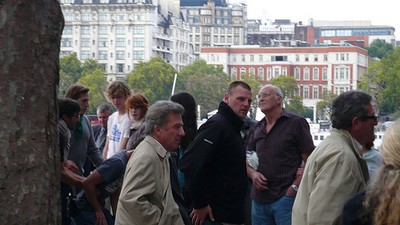
Harvey, what to do, where to go, after he leaves his daughter’s wedding that morning
My film studies books continually tell me the central actor or actress is crucial to the film and it’s partly their film so that when one lists whose movie it is, one must add to the chief producer, the director, and the screenplay writer, the male and/or female stars. This film made visible and lent on the social myths and hurts the types Hoffman and Thompson usually play.
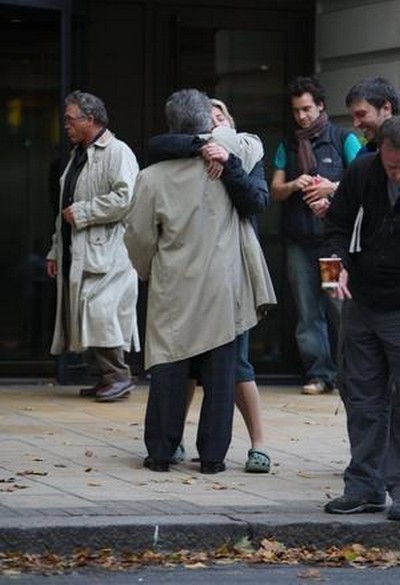
A final hug: not in film; Thompson does not wear slippers in the film, but high heels until the very last walking away together when he answers her questionnaire that he is “in transition”
There is this to be said on behalf of it seriously: the film conveys a genuinely subversive message through the sheer stills and dialogues. I’ve come across other blogs and comments on the film on the Net and repeatedly there is reference made to the closing moment. When Kate agrees to try to trust Harvey and attempt a new life together, she turns to him, and says “Shall we walk” and he says, “Yes.” In that moment and so many wordless others, it is apparent how much more sane, reasonable, and happy is their kind of quiet coming together for life than all the hoopla and hollow rituals they have had to spend years of their life doing. Not just weddings, but her asking people silly questions, and him writing inane neon-lit commercials.
I hurry up to write about the film and at length because, as Jim (my husband said), it has obviously been dumped onto the film distribution network. Yvette and I had determined we’d like to see it sometime in December when we read it was nominated for Golden Globes which it seems now it will not get. We noticed (or I did) it starred Emma Thompson and Dustin Hoffman. It was the names of the two stars, especially Emma Thompson (with Eileen Aitkins playing her mother as Aitkins played Thompson’s mother-teacher-mentor in Wit) that drew me. Yvette likes to see films which are nominated for Oscars and more elite awards. So we determined to try to see it, but alas heard no more of until I noticed it playing at odd hours in most local theatres, and in the pop (not the art) theatres in small back rooms.
In his book on costume drama (English Heritage, English Cinema: Costume Drama since 1980), Andrew Higson shows how crucial for both financial and social success for films is advertisement done in the right way, and that (obviously) no advertisement whatsoever generally means the death of the film. What happened? Why was this dumped? Who lost faith? I don’t know. Our central characters are aging and not made beautiful: refreshingly Emma Thompson has decided to eat during her life and in this film has a typical body for a woman in her middle fifties of a average size weight, big body and tallish; Dustin Hoffman’s hair is wild and he is shorter than she. As I’ve shown it is mainstream, buys into foolish social demands, is sheer and heterosexual romance (Before Sunrise and Before Sunset 30 years on).
Who offended who? Who refused to spend money? There are two production companies listed: Overture and Process, and 9
distributors. Are the production companies names for an independent production? I don’t know. Or maybe it’s that this year people prefer the agon into death of Kate Winslett (in The Reader and Revolutionary Road, see previous blog), grim relentless remorseless hopelessness, to the strength and tough snatches of happiness offered by the typecasting of Emma Thompson and Dustin Hoffman.
Ellen
--
Posted by: Ellen
* * *
Comment
- P.S. A wonderful letter from a friend last night. I had told her how I, the Admiral & Yvette had passed our day (whose physical social events included going to this movie and walking in a deserted Olde Towne on the lovely winter's evening), and that the Admiral had gone to sleep with our cats, and Yvette too, who had told me that many around us that night had been watching on TV football and eating snack foods and drinking beer, to which she replied: “The Super Bowl passed over our heads too, I don’t even know who played. Stupid thing. I did hear some hooting outside the window.”
Ellen
— Elinor Feb 3, 3:33am # - I would like to see this film, probably never come to Brazil. I saw Wit, The Winter Guest and love Emma Thompson and Phyllida Law, too.
— Raquel Feb 3, 8:51pm # - I’ve not seen The Winter Guest, but it sounds good. Tonight I was remembering some of the dialogues between Hoffman and Thompson. It seemed to me they paid gentle comic homage to her earlier films. They talk of books and he mentions E. M. Foster and Middlemarch which he’s heard of (can describe slightly) but not read. Thompson not only starred in Howards’ End, I’ve read she loved George Eliot in college.
Phyllida Law was in the Miramax Emma where her second daughter, Sophie Thompson played Miss Bates brilliantly, poignantly, by the side of Law’s Mrs Bates.
Ellen
— Elinor Feb 3, 11:53pm # - Sophie! she is Mary Musgrove in Persuasion 1995 too. And Phyllida is Mrs. Austen in Miss Austen Regrets
I love this family.
— Raquel Feb 4, 6:47am # - From Fran:
“Last Chance Harvey sounds like just the kind of film I would enjoy. By the way, what book it is that Emma Thompson is holding in one of the shots – that is very often some kind of shorthand to character or plot?
Fran”
— Elinor Feb 4, 9:23am # - Dear Fran,
I looked up on Amazon.uk and Amazon.com, and googled for the name of the author of that book Emma as Kate is carrying with her. There appears to be no such author as Anita Harman. My guess is the allusion or reference is to a certain kind of womans’ novel which women use to keep company with; on the level of Joanna Trollope, except without an illustration, it seems a little more elite in taste :) Anita is a common name among authors: Anita Brookner (with her abject women), Anita Desai, Anita Loos too.
There are two allusions to books in the movie I did think a direct reference to Emma Thompson. I forget how it came up, perhaps when they are walking through the books on bulks near the National Theatre. Harvey refers to E.M. Foster, and then self-deprecatingly says he’s not read him. Is that okay? She seems not to mind. E.M. Foster provided the text for Howards End, one of Thompson’s hits and which her screenplay and notion of Elinor Dashwood is said to be dependent on. Then again they are walking and this time she has a sturdy brown volume. Maybe he asks if it’s Middlemarch. I’m not sure, but Middlemarch comes up. Again he hasn’t read it, but seems to know of it, and again she says that’s okay. We don’t have to be that alike. I’ve read somewhere Thompson likes Eliot. She took an English degree in Cambridge.
In a way it is an anti-reading woman motif. Kate has a lowish job as a flight attendant who doesn’t fly but takes care of luggage at the airport. She’s the chief attendant but it’s not exactly a professional occupation. And it does matter, and sometimes very much, if a man doesn’t share a woman's tastes (though they do not have to share exactly the same taste in books). The thing is if they differ too much he will not want to do the things she does, and unless she is given time and money to do them on her own, she loses out. She also cannot have him as a companion in these things which provides such daily richness in life.
Still, these are allusions which belong to a movie centering as much on Emma Thompson as Dustin Hoffman. Thompson is continually pictured with a book and come to think of it, they may often change. In the second still of this blog she has a book with a picture of a woman dressed in a pre-20th century way.
Cheers,
Ellen
— Elinor Feb 4, 9:35am # - From Fran:
“Looking around for some more background on Last Chance Harvey, I came across an interesting promotion interview with Emma Thompson and Dustin Hoffman, mentioning that the idea of working together more intensively on a project had basically been born in the long waits and conversations they had had together on the set of ‘Stranger than Fiction’, where they were both pretty underworked. They hit it off so well there that when Thompson was offered the script, she contacted him.”
— Elinor Feb 7, 9:06am # - From a friend on Wompo:
“Ellen why don’t you post that review on D. Hoffman’s site? It is so comprehensive and well done, like all you set your mind to, thank you for your posts, your fan, Mary Rose Betten”
— Elinor Feb 8, 3:54pm #
commenting closed for this article
